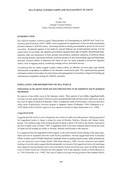Sea turtle conservation and management in Japan
นามธรรม
For conservation purposes, the Japanese government is directly regulating the taking of sea turtles, their international trade, domestic trade and possession of both animals and products; preventing eggs and hatchlings poaching, and promoting research efforts to determine the status of turtle population in the Japanese waters. Six turtle species occur in these water; 3 species, the loggerhead (Caretta caretta), green (Chelonia mydas), and hawksbill (Eretmochelys imbricata), nest on the coastal beaches of Japan, but the leatherback (Dermochelys coriacea), olive ridley (Lepidochelys olivacea), and black turtle (Chelonia agassizi) are known to only migrate into Japanese waters. Although a few individuals of black turtle were captured, migration of these species in Japanese waters is still questionable. Factors that are known to affect turtle population and distribution in Japan are coastal construction, beach erosion, human presence on the nesting beaches and nest predation. The government is promoting projects to reduce artificial debris on nesting beaches, prevents poaching of eggs and hatchlings, undertakes tagging and satellite tracking to determine the population structure and to monitor the nesting activities and hatching success.
การอ้างอิง
Abe, O. (1999). Sea turtle conservation and management in Japan. In Report of the SEAFDEC-ASEAN Regional Workshop on Sea Turtle Conservation on Management (pp. 108-117). Kuala Terengganu, Malaysia: Marine Fishery Resources Development and Management Department, Southeast Asian Fisheries Development Center.

